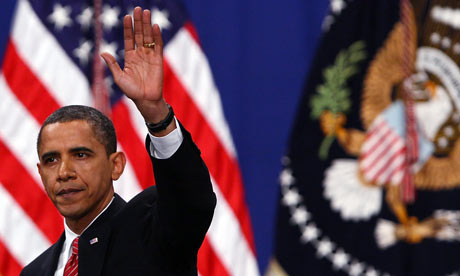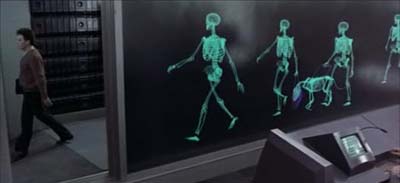A sample text widget
Etiam pulvinar consectetur dolor sed malesuada. Ut convallis
euismod dolor nec pretium. Nunc ut tristique massa.
Nam sodales mi vitae dolor ullamcorper et vulputate enim accumsan.
Morbi orci magna, tincidunt vitae molestie nec, molestie at mi. Nulla nulla lorem,
suscipit in posuere in, interdum non magna.
|
So with Al Quaeda essentially not hiding in Afghanistan — and certainly not operating terrorist training camps any more — why should the United States care about the Talban and a political “insurgency”? Our role is not to maintain of support the “national security forces” of third-world countries. Civil wars are the business of those fighting them. President Obama set a deadline, but this deployment has no defined mission and no clear objective. And for centuries Afghanistan has been the graveyard of foreign armies, including the Soviet Union. This is a tried-and-true recipe for disaster.

US General McChrystal Vows to Take Battle to Taliban [The Guardian].
McChrystal drew a distinction between al-Qaeda terrorists operating in Afghanistan, who he said were few in number and largely limited to non-combat support roles, and insurgents such as the Taliban. “What we are actually going to do is degrade al-Qaeda and prevent them being a threat and build up Afghan national security forces so they can deal with it effectively and so they will need less help. “We can significantly impact Taliban capacity in the timeframe of 18 months. We need to convince them … that [the insurgency] is a losing proposition.”
Posted via web from glenn’s posterous
The Obama administration shocked a lot of people — including this author — when an advisor announced Sunday that taxing medical insurance benefits is on the table as part of its so-called “health care reform” initiative. White House Open to New Tax on Health Benefits [washingtonpost.com]. The explanation, namely that everything is negotiable, rings very hollow. Obama campaigned hard on a pledge that anyone earning less than $250,000 would not see a tax increase under his health care reform proposal. Indeed, this was a central point during the debates in differentiating Obama from John McCain and painting a picture of a candidate more in touch with the concerns of everyday Americans.
Part of the real explanation, of course, is that to avoid (correct) charges of budget-busting, the Obama administration needs to craft a more “revenue-neutral” plan, and thus really needs the incremental revenue from such taxes. But from my vantage point, this is both opportunistic and cynical. Why should insurance proceeds, used to defray health care expenses, be taxed when for almost all taxpayers, insurance premiums are not tax deductible? This makes no sense from a tax fairness or financial perspective. To paraphrase a famous Ronald Reagan quip from New Hampshire in 1980, “we paid for those health benefits, Mr. Obama!”
Yesterday the U.S. House of Representatives voted to restrict TSA from conducting what have become known as “virtual strip-searches.” House Restricts “Strip-Search Machines” [WashingtonWatch.com]. The bill provides, among other things, that:
Whole-body imaging technology may not be used as the sole or primary method of screening a passenger under this section. Whole-body imaging technology may not be used to screen a passenger under this section unless another method of screening, such as metal detection, demonstrates cause for preventing such passenger from boarding an aircraft.
Although promoted as less intrusive than x-rays, explosive sniffers and the like, this new technology presents a significant threat to personal privacy. As the sponsor (Rep. Jason Chaffetz, R-Utah) said, “Nobody needs to see my wife and kids naked to secure an airplane.” My colleague Chris Calabrese of the ACLU makes it graphically clear:
these machines produce strikingly graphic images of passengers’ bodies when they are utilized as part of the airport screening process. Those images reveal not just graphic images of “naughty parts,” but also intimate medical details like colostomy bags.
 "Privacy Screen" Filter Privacy advocacy groups are, for obvious reasons, alarmed. It is very much like the “Tunnel of Truth” hypothesized in the 1990 sci-fi film Total Recall. That was scary indeed! Not unsurprisingly, on May 31, a coalition of advocacy groups including the ACLU, the Electronic Privacy Information Center, Gun Owners of America, and the Consumer Federation of America sent a letter to Homeland Security Secretary Janet Napolitano asking her to “suspend the program until the privacy and security risks are fully evaluated.”
That will never happen. It its zeal to “protect” Americans traveling by air, TSA has turned the check-in experience into the U.S. equivalent of the Star Chamber, where ordinary citizens are presumed to be dangerous just by, for instance, wearing shoes — now routinely x-rayed separately at every U.S. airport — or putting liquids into carry-on luggage. The millimeter wave and related strip-search technologies ratchet this up yet another level. Use of a “privacy screen” to cover intimate areas is hardly an answer.

Tunnel of Truth (1990)
In my view, TSA is out of control. Yes, there were security lapses leading to 9/11, but they did not arise from business or vacation travelers and, with a bit more diligence (like following up on middle eastern males taking flying lessons but rejecting landing practice) the government could target those likeliest to have real terrorist connections. Just as TSA’s “no fly list” was overreaching, so is virtual body searching. We do not need this and we do not need TSA. I say abolish the agency, something with which Jim Harper of the Cato Institute, the premiere libertarian think tank, agrees.
It was 20 years ago today (thanks, John & Paul…) that China sent its military into Tienanmen Square to put down a student-led uprising devoted to inculcating Western democratic values into the PRC. The photos of that young man standing in front of a row of tanks will never lose their place among the most famous images in history.
 Tienanmen Square 1990 But imagine if the Tienanmen protests had been coupled with the power of the Internet, especially social media. Just as news is dispersed even quicker on Twitter than Web-powered news sites — which themselves compress the news cycle to hours from days — the immediacy of social media provide a fertile ground for mass gatherings and other grassroots organizing efforts. In the U.S., we can see this with Tweetsgiving and the like, plus MoveOn and other progressive political activists. In the authoritarian parts of our world, however, it is the opposite.
The answer to the imaginary question is that if Twitter and other social media networks had been available in China, Shanghai might already be free, more than economically. One can see this clearly from the reaction of the Chinese party to social media in its preparations to bury anniversary celebrations of the Tienanmen massacre. China Blocks Twitter, Flickr, Bing, YouTube and Hotmail Ahead of Tiananmen Anniversary [guardian.co.uk]. It is hardly different from Iran, for example, which banned Facebook for nearly ten days leading up to its recent elections, or Cuba and other repressive regimes blocking Internet technology and sites in order to control propaganda. But the significance is overwhelmingly real. ”Information wants to be free,” the old watchword of hacking and digital freedom proponents, is alive and well in this Web 2.0 era. Just check out the trending Twitter topic #ChinaBlocksTwitter to see for yourself.
Alaska Sen. Ted Stevens has been a fixture for decades on Capitol Hill, which means by definition folks are afraid of him. In this case it also mean’s he’s dirty. Now the federal government — prosecuting Stevens for omitting $250,000 in home improvements from his financial disclosure forms — has totally botched the case by itself failing to disclose evidence to Stevens’ defense team. Judge Threatens to Throw Out Corruption Case Against Ted Stevens [L.A. Times].
That’s a Brady violation, so named for the Supreme Court case requiring disclosure of exculpatory materials to a criminal defendant. Basic, basic. Here the Assistant U.S. Attorney disclosed only a “redacted” — incomplete — copy of the government’s interview of its star witness. Turns out the missing stuff was also the good stuff. Good for Stevens and now bad for the people. In think this sullied old crook should be hounded out of office by the Alaska electorate or banned by the Senate Ethics Committee. A long time ago, Supreme Court Justice Benjamin Cardozo asked whether “the criminal should go free because the constable has blundered.” The answer to that is yes, but it’s no solace that a crooked politician gets away with corruption for such a stupid blunder.
This is why it is a really bad idea to text while you are driving. Train Operator Sent 29 Texts on Crash Day [ABC News].
I have tremendous respect for Prof. Larry Lessig of Stanford — developer of the Creative Commons license, author of Code and Other Laws of Cyberspace and a strong open-source software advocate. One of his most famous essays, from early in the Internet era, was titled “What Declan Doesn’t Get.” But Larry is also a dreamer, taking positions that as a practical matter are idealistic, not realistic. This one, I think, epitomizes that character trait. Lessig (and Others) Asks Candidates to Make Debates More Open [Post I.T.].
Who ever said these were really “debates” anyway? Lincoln-Douglas they are not, having calcified into a series of scripted mini stump speeches, in which the candidates are given a platform to offer bromides but never pressed by the media or engaged with each other. So to suggest that “new media,” bloggers and the like should participate misses the whole point. Major party candidates don’t want to debate. They like the dominance of debates by legacy television media; that’s the whole point, to STAY in their political comfort zone. It’s all good and well to propose otherwise, it’s just quixotic because no one who matters cares.
 I almost forgot about this little FBI fiasco from last week. Seems as if, seven years later, our wonderous federal forensic cops finally fingered the culprit in those Anthrax mail attacks against the Senate. Problem is, the perp committed suicide weeks ago. So the FBI’s “case” basically amounts to assertions that Bruce Ivins, a scientist with access to anthrax samples, could not “credibly” explain an alibi. F.B.I. Details Anthrax Case, but Doubts Remain [NYTimes.com]. I almost forgot about this little FBI fiasco from last week. Seems as if, seven years later, our wonderous federal forensic cops finally fingered the culprit in those Anthrax mail attacks against the Senate. Problem is, the perp committed suicide weeks ago. So the FBI’s “case” basically amounts to assertions that Bruce Ivins, a scientist with access to anthrax samples, could not “credibly” explain an alibi. F.B.I. Details Anthrax Case, but Doubts Remain [NYTimes.com].
No shit, “doubts” remain. Remember Richard Jewell from Atlanta, hounded mercilessly after being accused of the ‘96 Olympic bombings? He nearly bought the farm and was clearly innocent. The FBI’s disclaimer that “the many mysteries of the case meant an air of uncertainty would always surround it” is too little, too late. If American law enforcement can only solve cases years later by blaming dead guys, we as a society have mucho problemas.
Thirty years ago the U.S. Department of Justice, and its Honors Program for law school graduates, attracted some of the best-credentialed, smartest and most talented young lawyers around. It made DOJ a plum position for aspiring litigators, where one could "learn by doing" instead of watching others and — despite obvious financial sacrifices — allowed the federal government to recruit from the top law schools in the nation.
But now it seems the Bush Administration has totally politicized the Justice Department. As if firing U.S. Attorneys for political reasons — not being "loyal Bushies" according to internal emails — is not bad enough, now the DOJ Inspector general reports that senior political appointees at Justice have for six years been "using ideological reasons to scuttle the candidacy of lawyers who applied to the elite honors and summer intern programs." So members of the conservative Federalist Society got a free pass, without the resume to warrant a position, while members of the Nature Conservancy were nixed without consideration at all for being too liberal.
That’s revolting. It’s truly a sad end to a once impressive agency where I was proud to have stared my own legal career in 1982 after a judicial clerkship.
The recent history of antitrust — from Microsoft to PeopleSoft to Whole Foods — is one in which the conventional wisdom of how to define the “market” affected by mergers and other transactions is not infrequently dead wrong. Today’s big deal is Yahoo! establishing a test advertising outsourcing deal with Google. Many observers, including Microsoft’s General Counsel, have already opined that such a deal would be DOA, as it would add to the dominant firm in the “search advertising market.”

But is that really what’s going on here? I am not so sure. Search is only important as a vehicle by which web sites and portals aggregate users to sell to advertisers. It is also free to non-enterprise users. So a cogent argument can be made that Internet search is irrelevant except as an advertising tool and that Internet advertising is NOT the relevant market for this deal, because online advertising already is or shortly will be competitive with (in other words, a substitute for) traditional media advertising like radio, newspapers and magazines. And to limit Internet advertising to “search advertising,” but ignore the fact that it is AOL, Microsoft and Yahoo! who collectively have a significant advantage in non-search Internet advertising — which seems to account for a majority of all Internet advertising — on first blush suffers from that same old market defintion problem.
In fact, here’s what the Wall Street Journal had to say this morning:
Major brand advertisers are gearing up to move big chunks of money from traditional ads including TV commercials and glossy magazine spreads to online outlets such as video-sharing services and Web sites for women. Although online ads garnered only an estimated 7% of total U.S. advertising dollars last year, Internet companies believe the percentage will increase sharply as Americans ratchet up their daily use of the Web and advertisers gain confidence in the medium.
As an antitrust lawyer, that tells me the data to establish that Internet ads are a subset of a broader advertising market — one in which, almost by definition, Google is not a “dominant” or even large player — may be there. Now it’s up to the advocates, economists and enforcement officials to figure out the answer.
Disclaimer — I have provided analysis to stock brokers and market research analysts on the Microsoft-Yahoo! fight, but am not currently working as a lawyer for any party to or company interested in the potential transaction.
|
|





 I almost forgot about this little FBI fiasco from last week. Seems as if, seven years later, our wonderous federal forensic cops finally fingered the culprit in those
I almost forgot about this little FBI fiasco from last week. Seems as if, seven years later, our wonderous federal forensic cops finally fingered the culprit in those 